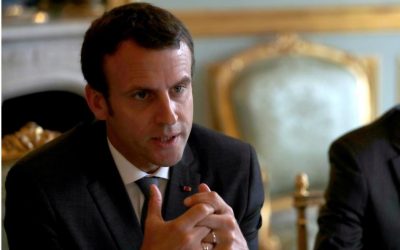Macron’s Push to Arm Europe Getting More Dangerous

All Global Research articles can be read in 51 languages by activating the Translate Website button below the author’s name (only available in desktop version).
To receive Global Research’s Daily Newsletter (selected articles), click here.
Click the share button above to email/forward this article to your friends and colleagues. Follow us on Instagram and Twitter and subscribe to our Telegram Channel. Feel free to repost and share widely Global Research articles.
Global Research Referral Drive: Our Readers Are Our Lifeline
***
Iran’s attack on Israel over the weekend was the grimmest proof yet that French President Emmanuel Macron’s diagnosis of the security challenges facing the European Union is correct, Bloomberg reported on April 16 in an article titled “Macron’s Push to Arm Europe Is Getting More Urgent — and More Dangerous.” The French leader’s problem, however, is that he has not yet achieved the support of French voters in the face of his hardline position to escalate a conflict with Russia by sending French troops to Ukraine. On the contrary, he has attracted the antipathy of some allies, both at home and abroad.
Oscillating between peacemaker and provocateur, Macron has shown that he wants to lead the bloc in the Ukraine issue. Only last week, his administration resumed telephone contact with Russia, which, according to Bloomberg, “because the detailed contents of the exchange weren’t made public, turned the overture into an awkward public-relations mess as both sides traded different accounts of the call.”
While Macron claims to want an end to the Ukrainian conflict, after meeting European leaders at the Palace of Versailles earlier this year, he famously refused to rule out the possibility of sending troops to the ground in Ukraine. However, instead of garnering support and dissuading Moscow from conducting any offensives, German and other European allies publicly discarded the idea and thus undermined any ambiguity that had been sown.
According to Bloomberg, low recruitment in the military restricts France’s aspirations for greatness. Comparatively, while Russia has around 1.15 million soldiers — which represents almost the entire population of neighbouring Estonia — France has just 200,000. Last year, its infantry recruited 3,000 less than the target of 16,000 new personnel.
In March, the French defence minister urged the country’s arms industry to speed up the production of equipment for Ukraine, threatening to requisition companies that failed to meet the desired pace. Some industry members were surprised by the public rebuke as they consider their factories to be running at full steam already.
The new French budget figures could also undermine Macron’s war effort. Last week, the government said that its deficit would be greater than expected this year, requiring an additional €10 billion in savings in addition to the number already announced.
Just as alarming as the budget struggles, French public opinion is turning against the continuation of the Ukrainian conflict — falling from 82% to 58% according to IFOP data — something that Macron put at the forefront of his campaign against Marine Le Pen. Polls also showed that the majority of the French people opposed the deployment of troops as proposed by the president.
Despite Macron wanting to escalate the war by sending troops, he confusingly also demands global peace for the duration of the Paris Summer Olympics from July 26 to August 11. The French leader said in a recent interview with RMC and BFMTV that he would do all he could to achieve an “Olympic ceasefire,” specifically referring to the Israel-Hamas War, the Ukraine War, and the war in Sudan, and added that he is counting on the assistance of Chinese President Xi Jinping to achieve this.
“The leader of China is coming to Paris in a few weeks. I asked him to help me. In 2022, he also faced such a task during the Winter Olympics, which China hosted,” Macron said.
On the one hand, Macron actively seeks to escalate the conflict in Ukraine, but on the other, he wants Beijing to convince Moscow to hold off on its expected summer offensive, not for the sake of achieving lasting peace but instead to avoid inconvenience and distracting Paris with further bad news from the Ukrainian front when it is hosting one of the world’s largest sporting events.
Regardless, even if China wanted to deter Russia from the summer offensive, the Kremlin would not be compelled to do Macron any favours.
Macron’s delusions of grandeur have only deterred many voters from supporting him. Just as importantly, he has isolated himself from the general Western consensus, with the USA, Germany, and other major NATO members distancing themselves from his idea to send troops to Ukraine.
Although Macron’s idea has been shunned domestically and by foreign partners, it is a demonstration of how his push to arm Europe is certainly getting more urgent and more dangerous, as Bloomberg warned. Deepening confusion is that Macron is permitting hidden communications with Russia in a bid to establish peace for the Olympics period, but his public statements show an intention to escalate the war in Ukraine once the Games are over. This means that Macron is not only becoming more dangerous in his actions, but also desperate.
*
Note to readers: Please click the share button above. Follow us on Instagram and Twitter and subscribe to our Telegram Channel. Feel free to repost and share widely Global Research articles.
Ahmed Adel is a Cairo-based geopolitics and political economy researcher. He is a regular contributor to Global Research.

